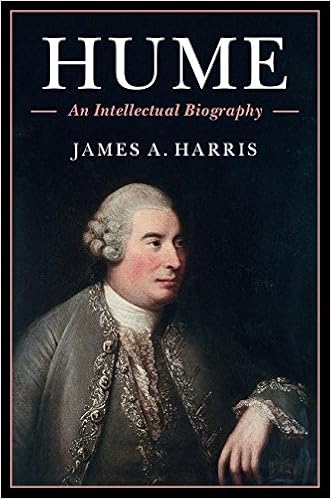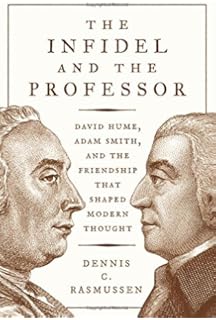"Man was made for action" — David Hume
Agustín Mackinlay | @agumack
— James A. Harris. Hume. An Intellectual Biography. Cambridge University Press, 2015 [review] [VIDEO].
— Ryan Patrick Hanley (ed.). Adam Smith. His Life, Thought, and Legacy. Princeton University Press, 2016.
— Dennis C. Rasmussen. The Infidel and the Professor. David Hume, Adam Smith and the Friendship that Shaped Modern Thought. Princeton University Press, 2017.
* * *
"The Scottish Enlightenment is now widely regarded as an intellectual
golden age, the rival of Periclean Athens, Augustan Rome, and
Renaissance Italy". So writes Dennis Rasmussen in the introduction of
his book on the friendship between two intellectual giants: David Hume
(1711-1776) and Adam Smit1727-1790). Horace Walpole declared that
Scoltand was "the most accomplished nation in Europe"—and that was in
1758, before the publication of Smith's books and of Hume's final
volumes of the History of Great Britain. The three books surveyed
here allow us to understand the enormous impact of these two great
Scottish thinkers. And although they have very different formats and a
different target audience, they complement each other well.
Adam Smith: His Life, Thought, and Legacy
The most striking fact about the volume edited by Ryan Patrick Hanley is
its innovative format. Instead of a dozen or so articles on different
aspects of Smith's writings, the book contains no less than thirty-two
short contributions that span a surprisingly wide range of topics like
finance, politics, history, behavioral economics, economic development,
freedom, justice, rhetoric, enlightenment studies—and
even feminist ethics and corporate governance. Each article includes
its own bibliographical essay, which I found especially useful. Rather
than a detailed review of each section, I will concentrate on some of
the aspects that I found most striking and interesting. Most of my
comments are based on my reading of the Wealth of Nations, as I have read only parts of TMS, RJ and LBLR.
First, I am delighted to note the emphasis on security as a pillar of Smith's thought. Does that reflect the impact of my blog posts on the matter? (1, 2, 3).
I don't rule that out, as I remember an earlier email discussion on
this very topic with Nicholas Phillipson, who pens the piece on "Smith
and the Scottish Enlightenment" (pp. 105-119). There are some very good
quotes on the importance of security throughout the book: "Security is
the first and the principal object of prudence" (TMS, p. 143). Writing
on WN, Jerry Evensky concludes: "Thus in Smith's analysis security is
the sine qua non of the dynamic of accumulation, investment, and growth"
(p. 74). In a little known work on The History of Astronomy
discussed by Craig Smith, Adam Smith states that only when "order and
security" have been established can scientific endeavour flourish (p.
95).
Maria-Pia Paganelli, whom I had the pleasure to meet at the Colloque International Économie et Politique chez Ferdinando Galiani (Lyon 2015) [see],
writes on "Adam Smith and the History of Economic Thought: the Case of
Banking" (pp. 247-261). She does not deal with Smith's (difficult) pages
on the Amsterdamse Wisselbank, the 'mother' of central banks. In the
midst of the Eurozone crisis, back in 2011, I suggested that Smith's
views on the Bank of England were particularly useful, as he takes note
(in WN) of the contrast with France, a country without the equivalent of
that money-printing institution, a central bank all but in name [see].
There is no shortage of analysis on the broad topic of Adam Smith and
justice. In that regard, I particularly liked the pieces by Nicholas
Wolterstorff, Chad Flanders and Lisa Hill. But what is the foundation of
security and justice? I will never tire of quoting Smith's remarquable
passages on what we nowadays call 'judicial independence' in LBLR [see] and WN [see].
There is no mention of these passages in the book. Yet I think they provide the key to Smith's système
as a whole. Consider Lisa Hill's quote about the beneficial impact, in
social terms, of high wages ("Adam Smith and Political Theory", p. 334).
In Book I of WN, Smith makes it clear that high wages are a function of
the low cost of capital—which depends on the security of possessions,
which in turn depends on ... judicial independence! While it would be
unfair not to mention other articles, I must say that I particularly
liked the contributions of Michaël Biziou's on "Adam Smith and the
History of Philosophy" (pp. 423-442) and of Frederik Albritton Jonsson
on "Adam Smith and Enlightenment Studies" (pp. 443-458). And, as a
lecturer on Finance, I was pleasantly surprised to find John Bogle —the
innovator who launched the 'passive asset management' revolution— as the
author of a piece on Smith and shareolder capitalism (pp. 525-541).
Hume: an Intellectual Biography
This is the most difficult, and the most rewarding, of the three books presented here. James A. Harris is Reader in the History of Philosophy at the University of St. Andrews. His book is an intellectual
biography of David Hume—as such, it contains little information on
Hume's life itself, unless a particular biographical episode helps to
explain an idea. The book is an amazing tour de force. Skilfully
guiding the reader through the chronology of Hume's publications, Mr.
Harris manages to cover all aspects of Hume's thought: the theory of
knowledge, history, economics, politics and religion. I can say little
on the theory of knowledge. However, I will venture this: Hume may be a
very relevant author for those who seek to know more about the meaning
of Big Data, algorithms and Artificial Intelligence. What is Big Data if
not the numerical expression of 'experience and observation' as defined
by Hume? Mabye I'll come back to that point later on in the blog (I
need to do more reading!).
But let me mention the parts of the book that deal with politics and
history. The key elements are to be found between pages 331 to 340 and
385 to 433. Hume updates Polybius's anacyclosis —the theory that
explains how mixed regimes can temporarily avoid decline— by
incorporating two modern elements: on the one hand, commerce and the
increasing importance of property rights (here Harrington
is a key source); on the other hand, the balance of power at the
international level. These pages are absolutely fascinating. Following
Polybius, Hume decries the lack of authority as the key threat to
stability, and as the leading cause of tyranny. However, an excess of
authority is bound to suppress freedom, causing as much damage. Mr.
Harris quotes Hume himself: "In all government, there is a perpetual
intestine struggle, open or secret, between AUTHORITY and LIBERTY; and
neither of them can ever absolutely prevail in the contest".
For Hume, defined by Mr. Harris as "the scientist of politics", two
apparently contradictory ideas —absolutism and 'libertarianism'— need to
be combined in order to achieve stability and prosperity. The chapters
of the History dealing with the revolutions of the XVIIth century
provide a brilliant illustration of this idea. In fact, I would argue
that Hume's debt to Polybius is enormous, a point that requires more
research. As Mr. Harris indicates several times, Hume went back
periodically to his Latin and Greek sources, and Polybius features
repeatedly in his essays. Hume's tremendous success as an author was due
to the fact that he avoided being pinned down either as a tory or a
whig historian. His deep knowledge of classical authors served him well
in that regard. (Time permitting, I will write a longer review of Hume: An Intellectual Biography in coming weeks).
The Infidel and the Professor
Unlike the previous two books, The Infidel and the Professor is about a story. And that story is the friendship between David Hume (the Infidel) and Adam Smith (the Professor). Dennis C. Rasmussen,
an associate professor of political science at Tufts University, takes
us through the subtle points of disagreement between Hume and Smith: the
advantages of the commercial society (with DH more sanguine on this
point), religion, happiness and work, the drawbacks of inequality, etc.
There is more material on the importance of security, especially on
pages 162 and 163. (Again: did my own blog posts launch that
discussion?). Yet, Smith's passage on judicial independence as the
foundation of security remains unquoted. The parts on Hume's theory of
knowledge and on the ill-fated encounter between Hume and Rousseau are
very good.
Mr. Rasmussen devotes a great deal of attention to the brouhaha
surrounding Hume's death. Again, the story is very well told—and the
annex of the book is very helpful in that regard. Books like this are
especially useful because most readers are naturally attracted to
stories. And if the story is compelling enough —as is the case here— the
reader is likely to come back for more: perhaps an intellectual
biography first, and then the writings of Hume and Smith themselves. So
we've come full circle. One point that I found wanting in the books
reviewed here (especially the first and the third) is more analysis of
the relationship between DH/AS and French philosophes (excepting poor Jean-Jacques). Both DH and AS were
admirers of Montesquieu, and both nurtured deep friendships with the
likes of d'Alembert, Turgot, Helvétius and d'Holbach, to name but a few.
Smith himself made the journey to Geneva to meet Voltaire. Yet there is
no mention of the impact of Raynal's Histoire des deux Indes on WN; and Mr. Harris appears to describe Condorcet's Esquisse as a contemporary work (it was published in 1794).



No comments:
Post a Comment